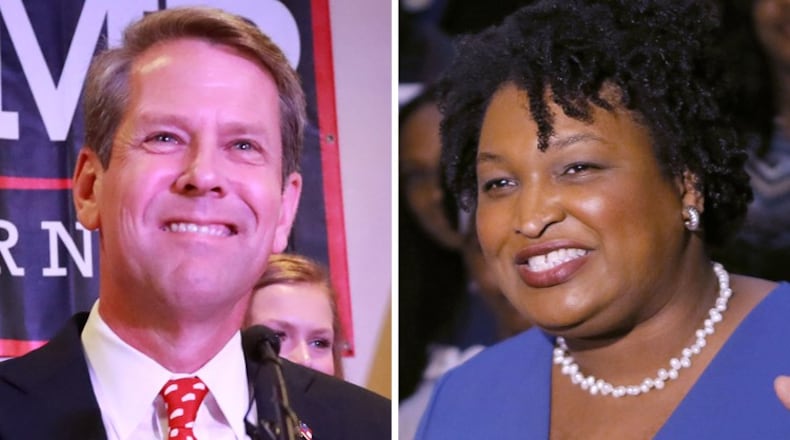The swirl of social issues that dominated the debate early this year may as well seem an afterthought now – and that’s exactly the way the candidates like it.
Republican Brian Kemp is more likely to talk about his law-and-order policies and his teacher pay raise plan than divisions over guns, abortion and “religious liberty” — or his edgy ads featuring shotguns and chain saws that he used to help distinguish himself from other GOP candidates.
And Democrat Stacey Abrams has upped her focus on the same themes she’s embraced since entering the race: expanding Medicaid and boosting school funding. She’s likely to only wade into debates over, say, abortion rights, if specifically asked about them by voters.
But that doesn’t mean those fights have disappeared. Although a recent Atlanta Journal-Constitution poll shows voters are most concerned about education and health care, there’s a deep undercurrent of concern about social issues.
At a Newnan barbecue, Kemp supporter Loreli Scott was blunt: “I believe in the Constitution, and it’s critical we have someone who supports its conservative values.”
And Ashley Grizzle Soeder, an Abrams backer from Senoia, was just as sharp: “I am very concerned that Kemp is part of Trump’s hate-filled agenda. I’m worried about all — every one — of the social issues.”
Those types of fights have a knack for dominating conversation in Georgia and sucking up the oxygen around fights over other pressing issues, such as budget policy and infrastructure improvements.
Just ask Gov. Nathan Deal, who bucked his own party’s base by vetoing a religious liberty proposal and nixing a gun rights expansion — leading some enraged activists to call for his resignation.
Flashy fights
That religious liberty veto in 2016 will go down as one of Deal's signature decisions, but it did little to quell the clamor among other Republicans for the legislation, which supporters see as a noncontroversial way to provide more legal protection to the faith-based.
It's one reason why Kemp and most other Republican candidates for governor quickly signed a pledge to support the legislation if elected, even as Democratic critics assailed the measure as thinly veiled discrimination and point to threats of boycotts from major corporations if such a measure becomes law.
Since securing his party's nomination, though, Kemp has tried to add some nuance to his stance. He's said he would veto any measure that veers from the federal version, known as the Religious Freedom and Restoration Act, that became law in 1993 on a bipartisan vote and bears Bill Clinton's signature.
“It’s time to do that, put that behind us so we can move on,” he said, adding: “That’s all I’m committing to do. Anything else, I’ll veto it.”
Abrams has sharpened her already razor-edged opposition to such legislation, telling crowds at business functions that no religious liberty bill "will ever become law in the state of Georgia" because it's both "divisive and discriminatory."
And she recently unveiled endorsements from business owners who warned of a devastating economic backlash if Kemp made good on his promise.
"This is not an idle threat," said Andrew Feiler, an artist and film industry entrepreneur. "We've spent two decades building the film industry, and RFRA would have directly affected our business."
The divide is just as stark over guns, where Abrams has broken from decades of conventional Democratic strategy in Georgia by calling for new firearms restrictions. She often says such limits are now in the mainstream, pointing to polls that show broader support for new regulations.
Her proposals include support for universal background checks for private sales of firearms, a ban of high-powered assault rifles and a repeal of legislation that allows permit holders to carry weapons on college campuses.
‘Bring it’
Kemp, meanwhile, parlayed his vocal support for an expansion of gun rights to emerge from a crowded GOP field.
His ad showing him pointing a gun toward his daughter's young suitor attracted national attention, and it helped him win endorsements from GeorgiaCarry.org and, later, the National Rifle Association.
He supports "constitutional carry," which would let gun owners conceal and carry handguns without a permit, and he proposed a sales tax holiday for guns and ammunition. Kemp also wants to end some "gun-free" zones and praised the state's rebuke to Delta Air Lines after it ended a discount for NRA members.
There's an equally gaping divide over abortion rights, sparked by Kemp's vow to "sign the toughest abortion laws in the country" if he's elected. He adopted that position hours after Mississippi enacted a law that bans most abortions after 15 weeks.
“If abortion rights activists want to sue me … bring it!” he wrote in March. “I’ll fight for life at the Capitol and in the courtroom.”
As for Abrams, she brandishes support from Planned Parenthood, a move she said would ensure that the "issue of reproductive choice and reproductive health will not be an offshoot conversation" in the governor's race.
“It will not be a quiet whisper,” Abrams said of her opposition to abortion restrictions. “It will be a proud and central facet of this campaign.”
OUR REPORTING
The Atlanta Journal-Constitution will focus this week's election coverage on how the two major candidates for governor, Republican Brian Kemp and Democrat Stacey Abrams, plan to deal with key issues facing Georgia. Numerous AJC stories have already explored major issues such as health care, criminal justice and public safety. Look for more at ajc.com/politics as the state approaches Election Day on Nov. 6.
Sunday: Priorities in the state's budget
Monday: Problems facing rural Georgia
Tuesday: What needs to be done about education
Wednesday: Where candidates differ on social issues
Thursday: What's needed to improve transportation
Friday: Impact on the state's relations with the city of Atlanta
About the Author
Keep Reading
The Latest
Featured



